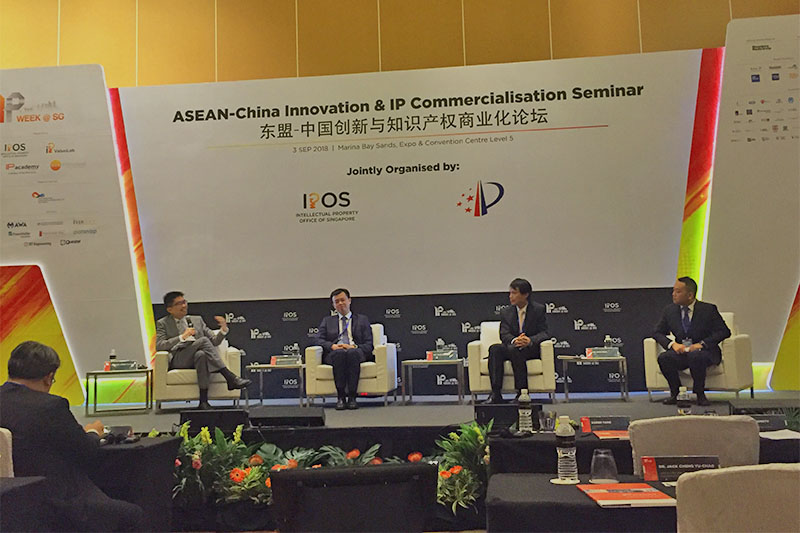
“China, China, China.”
This isn’t a lyric line from a satirised remix. It’s a buzzword – the talk of IP Week @ SG 2018. China’s eminence in any forum comes as no surprise given the country’s behemoth importance in the global political economy. Trade wars aside, what is interesting to note is how China is putting a spin on its “World’s Factory” title.
No longer monotonously piecing colourful plastic objects on steely assembly lines, China’s manufacturing centres are rolling out cutting edge equipment built with only the latest technology. Technology the world has never seen. The country has metamorphosed from brazen copycat to legendary unicorn. So progressive is the transition that the number of unicorns in China far outweigh those in traditionally tech savvy countries like the United States.
OpenGov Asia attended the ASEAN-China Innovation & IP Commercialisation Seminar, an associated event part of the IP Week @ SG’s associated events. Organised by the Intellectual Property Office of Singapore (IPOS) and the Chinese patent office, State Intellectual Property Office (SIPO), the panellist discussed how China’s tech companies should leverage on intellectual property rights.
The tune of China’s intellectual property song rings different from the dawn of its economic liberalisation. Chinese companies weren’t clued in on what the fuss about intellectual property was. Flaunting intellectual property was almost necessary to get by.
Artificial Intelligence with Chinese Characteristics
Compared to its tainted past of technology mimicry, China’s economy is now significantly driven by home-grown technology innovations. Matter-of-factly, Mr Darren Tang, Chief Executive of IPOS, remarked that as economies prosper, countries will progress from copying to creating since they have the requisite talent and capital. The most successful businesses in China use some variant of artificial intelligence and blockchain technologies. More than just the basic tenets of products launched nowadays, China’s fascination with breakthrough technologies is not subtle.
Chinese researchers publish the largest number of AI related theses which are frequently cited to uncover new tech capabilities. Not quite surprisingly, China is also the world’s largest filer of patents. With close to 1.3 million applications filed in 2017, it overtakes previous competitors in Northeast Asia, the United State and the EU.
The sheer volume of trade in AI technologies have also heavily impressed China’s balance sheets. China National Intellectual Property Administration Commissioner Shen Chang Yu noted a significant growth in the country’s AI exports, larger than the volume of AI imports into the country.
However, the panellists at the seminar weren’t particularly tickled by these technologies alone. While it is certainly untrue that they aren’t on the bandwagon (for some of the panellists were from leading Chinese tech unicorns), their reservations stemmed from doubts about how the field of technology was developing.
Their reasoning was simple: the latest technology should not be used for the sake of upgrading or simply staying on trend. Instead, technologies like blockchain and AI should be used as a tool to solve a real-world problem. Innovation is about user centrism, not the innovator’s whims or fancies. The ethos of problem-based inventing must be drummed into the innovation process. Only when an inventor has made significant headwinds in responding to an urgent societal need can his/her invention be considered novel enough to be granted a patent, and subsequently monetised.
Going Beyond Pragmatic Innovation
Panellists wanted businesses to have a paradigm shift in how they viewed innovation and intellectual property rights. Instead of unfeeling pragmatism, business owners should consider the strategic impact of their innovations. A good intellectual property management strategy is a useful way for companies to grow profits and spread influence. Building a recognisable brand might have weightier intrinsic value than high profit margins. A recognisable and trustworthy brand works for itself to bring home the bacon.
Comparing one’s business to Silicon Valley’s tech giants in this case might be futile. Just because they generate a huge volume of patents year on year, observers should dig deeper to uncover if these inventions are of quality, noted IP lawyer Mr Yang Ming-Tao. He thinks that businesses should strive for purposeful AI, or the scope and depth of impact AI can reverberate.
Hence innovating and then patenting a product is a piece of cake. The real challenge is in developing a cutting-edge product which boasts technology which can be transferred to improve existing projects. Patenting a technology is more than a defensive mechanism. Intellectual property is a powerful tool to assert oneself as an authoritative, luminary leader in a field. The real asset protected is not the physical asset, but the intangibles associated with the invention.
Contravening Deng Xiao Ping’s adage, it does matter if the cat is black or white. Because it isn’t just about the rat caught. Its about how the cat thinks and acts, which changes the way it snags the rat. Refreshing Deng’s philosophy will brand China as a global tech leader.
















